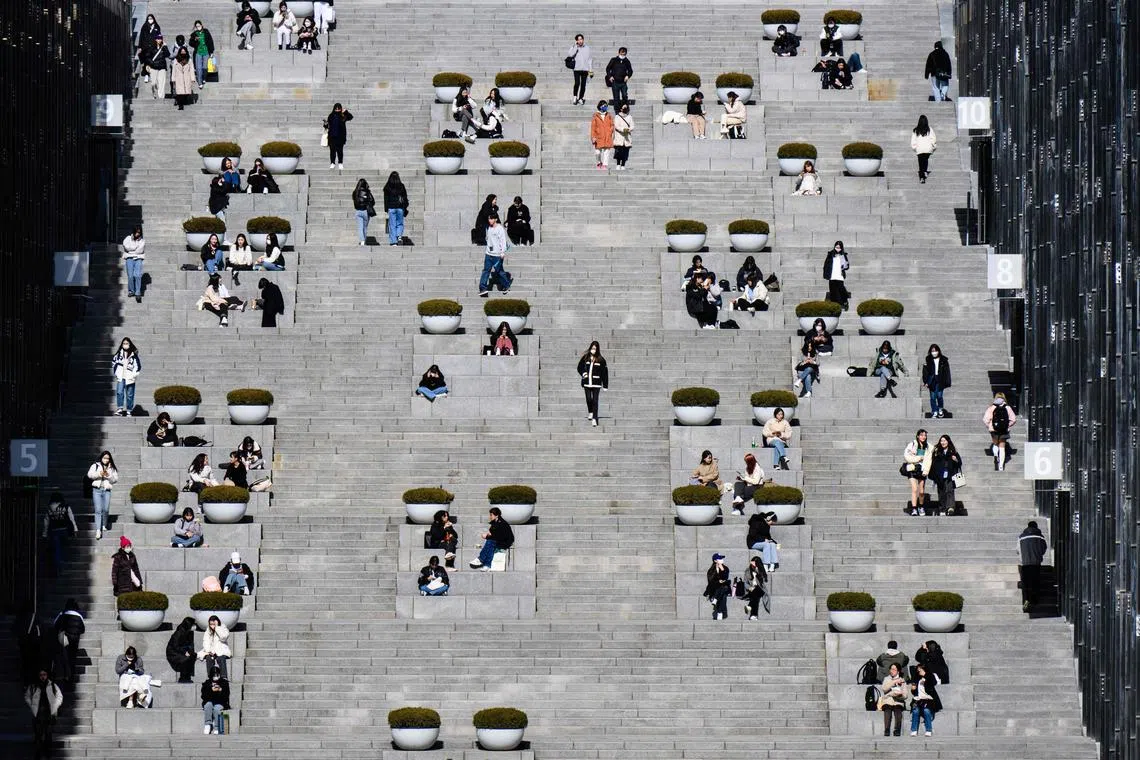Bullying records to be reflected in South Korea’s university admissions
Sign up now: Get insights on Asia's fast-moving developments

The new measures mean that universities will have to look closely into high school disciplinary records during both early and regular admissions.
PHOTO: AFP
SEOUL – Students with a history of bullying will have their records reflected in the regular college admissions process, while the government considers extending the bullying record retention period so that any history of bullying will follow perpetrators as they apply for jobs after college.
During a consultation meeting led by the ruling People Power Party and the government on Wednesday to combat the growing cases of school violence across the nation, Mr Park Dae-chul, head of the National Assembly’s Policy Committee, stressed the importance of strengthening anti-bullying measures to respond more strictly to perpetrators.
The stronger measures will force students to take responsibility for their transgressions when they apply for college, Mr Park said, explaining why the bullying records will also be reflected in the regular admissions process.
Currently, a student’s grades, attendance, test scores, after-school activities and a teacher’s recommendation letter weigh heavily in the race to get into college.
Lesser infractions and other school records are reflected only in early admissions, although they do not currently hold the same importance as transcripts.
The new measures mean that universities will have to look closely into high school disciplinary records during both early and regular admissions, in addition to the transcripts of the courses a student has taken.
A string of bullying allegations against South Korean public figures have made headlines in recent months, among them the director of hit Netflix drama The Glory Ahn Gil-ho.
Ironically, The Glory is a thriller involving female protagonist Moon Dong-eun in her quest for revenge against her bullies during her school years.
At the consultation meeting, which took place in the conference room of the National Assembly building in central Seoul, Mr Park said that the bold approach comes as South Korea faces an uphill battle against school violence.
“As people pay more attention to the widespread problem and the seriousness of bullying, it’s pivotal to raise public awareness as school violence cases have been soaring in recent years. We will make sure to tackle school violence issues by tightening... countermeasures,” he said.
Mr Park also said that dramas and media have recently shed light on school violence and the importance of protecting the victims, highlighting that it is necessary to look back on the existing policies and consider ways to combat bullying in a way that the public can sympathise with.
Members of the ruling party echoed the importance of increasing the severity of the punishment for the perpetrators and keeping the perpetrators’ records, and also called for better violence prevention education programmes to reduce instances of school violence at the source.
In particular, the government will focus on beefing up measures against the offenders, prioritising and ensuring victims’ safety, focusing on the role of teachers in preventing school violence and improving bullying guidelines for schools.
Recently, President Yook Suk-yeol’s initial nominee for the head of the National Office Investigation, Mr Chung Sun-sin, came under fire for taking legal action to defend his son, who reportedly bullied his classmates.
According to local reports, the students bullied by Mr Chung’s son have struggled to continue with their studies in South Korea.
Following the result of a public survey, the council also decided to increase the current record retention period of three years, keeping records available until a student tries to get a job, which will ensure that they will not be able to escape their history of bullying.
This emphasises the seriousness of bullies’ actions even after they graduate from college.
The ruling party and the government plan to hold a task force meeting on preventing bullying presided by Prime Minister Han Duck-soo to finalise the set of measures and push for legislation, including preventing cases of school violence.
Meanwhile, the government also seeks to expand the number of emergency medical centres for severe cases from the current 40 to 60.
Mr Park said during a party-government consultation on paediatric and emergency measures that increasing the number of critical care facilities will lower the risk of death for patients.
“We will increase the number of centres for medical emergencies, allowing people to easily access (the centres) within an hour from where they live,” Mr Park said.
He added that working conditions for medical personnel, including duty payments for those working weekends and holidays, will improve.
Regarding the sharp decline in paediatric services, Mr Kang Gi-yun of the ruling party, who is the vice-chair of the National Assembly’s Health and Welfare Committee, stressed the need for a long-term planning process on a governmental level to secure clinical care for young children. THE KOREA HERALD/ASIAN NEWS NETWORK


